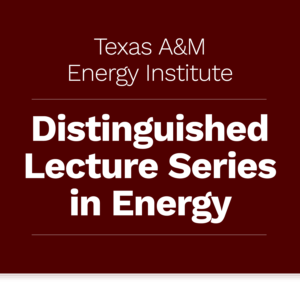Achieving a Net-Zero Future: The Role of Nuclear Energy

The next presentation in the Distinguished Lecture Series in Energy, featuring Dr. Shannon M. Bragg-Sitton, the Director for the Integrated Energy & Storage Systems Division in the Energy & Environment Science & Technology Directorate at Idaho National Laboratory, will be held on Wednesday, February 7, 2024, from 11:00 a.m. – 12:00 p.m. CST (UTC -6:00) in the Frederick E. Giesecke Engineering Research Building (GERB) Third Floor Conference Room and through a Zoom Meeting. The topic will be “Achieving a Net-Zero Future: The Role of Nuclear Energy.”
Biography
Dr. Shannon Bragg-Sitton is an internationally recognized pioneer in the innovative application of nuclear energy alongside other clean energy generators, seeking to maximize energy utilization, generator profitability, and grid reliability and resilience through systems integration. Shannon is the Director for the Integrated Energy & Storage Systems Division in the Energy & Environment Science & Technology Directorate at Idaho National Laboratory, which includes Power and Energy Systems, Energy Storage and Electric Transportation, and Hydrogen and Electrochemistry departments. She also serves as the National Technical Director for the DOE Office of Nuclear Energy Integrated Energy Systems (IES) program, which has developed novel modeling and simulation tools for technical and economic assessment of multi-input, multi-output IES and supporting experimental capabilities. Dr. Bragg-Sitton is also the Chair of the recently established Gen-IV International Forum (GIF) interim Task Force (iTF) on Non-electric Applications of Nuclear Heat (NEaNH). Prior to her current position, Shannon has held multiple leadership roles in DOE Office of Nuclear Energy programs since joining INL in 2010, including program leadership for space nuclear power and propulsion systems, advanced nuclear fuels, and microreactor development.
Abstract
Governments and private industry around the world have established aggressive goals to achieve net-zero emissions for the power, industrial, and transportation sectors by 2050. These aggressive goals demand immediate action if we are to be successful, and they require us to think more holistically about our clean energy options. Programs within the U.S. Department of Energy (DOE) are addressing these holistic solutions.
Traditionally, electricity generation and management are considered independently from meeting energy demands for industry and transportation. As we seek to eliminate emissions across all energy use sectors we need to reassess how energy demands are met. When we consider overall energy use, only one-third is in the form of electricity. Additional energy demands are in the form of heat or steam for industrial processes, in addition to direct fuel use for transportation. These sectors are much harder to abate, and electrification may not be the best option. Reducing environmental emissions at an affordable cost, while maintaining grid reliability and resilience, will require us to leverage all of the clean energy resources available.
The DOE Office of Nuclear Energy (DOE-NE) program on Integrated Energy Systems (IES) is led by researchers at Idaho National Laboratory (INL), and work is conducted in partnership with an array of other DOE laboratories, industry, and academia. The primary focus of IES research is to assess the technical and economic potential of nuclear-driven IES to enhance the flexibility and utilization of nuclear reactors working alongside renewable generators to meet an array of energy demands—thereby maximizing the utilization of clean energy resources across all energy sectors. Various energy applications and product streams beyond electricity are being evaluated, ranging from generation of potable water to production of hydrogen, fertilizers, synthetic fuels, and various chemicals. The DOE-NE program additionally partners with the Hydrogen and Fuel Cell Technologies Office under the DOE Office of Energy Efficiency and Renewable Energy to jointly fund the development of analysis tools, technologies, and nuclear-integrated hydrogen demonstration projects. This presentation will highlight the wide array of R&D being conducted across multiple DOE-funded programs to develop and deploy nuclear-based IES that will be key to achieving our net-zero goals. By working with key collaborators in the nuclear industry, analytical studies are now becoming a reality in demonstration projects.
